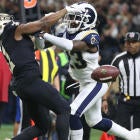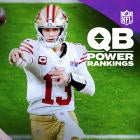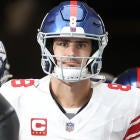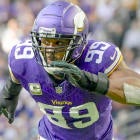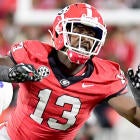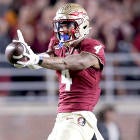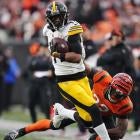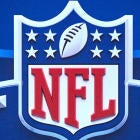After all the insanity of Championship Sunday wrapped, it was almost hard to comprehend all the crazy things that happened throughout the day. One thing stood above all else though: the Rams pass interference penalty against the Saints that went uncalled by the referees and ultimately allowed the Rams to advance to their first Super Bowl since 2001.
Lingering with that game and the outcome is the NFL's lack of a statement about the lack of a penalty. And lingering over that is a pretty insane and broad rule in the NFL rulebook that would allow NFL Commissioner Roger Goodell, should he so choose, to reverse or reschedule the outcome of the game between the Saints and Rams.
No, really. Goodell could either tell the Rams "sorry" and send the Saints to the Super Bowl or he could make them play the NFC Championship Game again. Either situation falls deep in the realm of the unlikely, but Rule 17, Section 2, Article 1, as noted by Pro Football Talk's Mike Florio, does exist.
And it reads like this:
"The Commissioner has the sole authority to investigate and take appropriate disciplinary and/or corrective measures if any club action, non-participant interference, or calamity occurs in an NFL game which the Commissioner deems so extraordinarily unfair or outside the accepted tactics encountered in professional football that such action has a major effect on the result of the game."
Would Nickell Robey-Coleman admitting he was trying to tackle Tommy Lee Lewis because he was beat for the touchdown qualify under "extraordinarily unfair"? That's probably a stretch, but you can certainly make the case for the Saints winning if the flag was thrown. They would have taken knees or run straight up the middle until there was minimal time on the clock, called timeout and let Wil Lutz kick a field goal to win. Lutz made a longer field goal on the next play anyway.
If the NFL decided it did qualify, Goodell, the rulebook continues, could change history:
"The Commissioner's powers under this Section 2 include . . . the reversal of a game's result or the rescheduling of a game, either from the beginning or from the point at which the extraordinary act occurred."
Again, this is very, very, VEEEEEEERRRRRRRY unlikely to happen. Even if some Saints players want it to, like receiver Michael Thomas.
Rule 17 Section 2 Article 3 @NFL 💔⚜️
— Michael Thomas (@Cantguardmike) January 21, 2019
Much more likely is the NFL, as Florio reported on Sunday night, issuing a public apology to the Saints and hitting the refs who caused the issue with a suspension or some form of punishment for missing the call.
Then the NFL will move forward and try to find a fix for the issue, in so much that a league depending on the eyesight of 60-year-olds instead of technology and its billions of dollars in revenue to determine the outcome of games can find a fix.
According to Saints coach Sean Payton, who spent roughly five minutes berating the refs in the game, he spoke to the league after the game and got an apology from someone.
"Just getting off the phone with the league office. They blew the call," Payton said following the loss. "Man, there were a lot of opportunities though, but that call puts it first-and-10 and we'd only need three plays. It's a game-changing call. That's where it's at, so it's disappointing. For a call like that not to be made, it's just hard to swallow."
The Saints didn't lose strictly because of that no call on pass interference. But the no call certainly didn't help: they would have kicked a field goal to avoid overtime and they probably would still be celebrating on Bourbon Street.
Instead, the Saints and their coaches and their fans are sitting around wondering what could have happened for this special team and probably looking towards the refs when they try to place blame.
On the bright side, the option to have Roger Goodell completely flip the outcome of the game still exists! It's just probably not going to happen.













